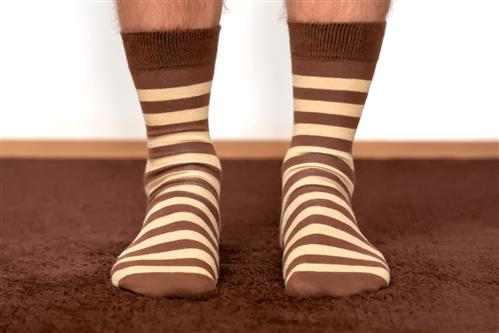Keep Your Feet Warm to Avoid Potentially Serious Health Risks
Keeping your feet warm during the winter months isn’t just important for good foot health and comfort, it’s also important to good overall health. Foot specialists say cold feet can weaken your immune system and can also cause problems with certain health conditions such as diabetes. Wearing appropriate footwear during the winter months, especially when participating in outdoor winter activities, can help prevent sickness and injury.

Overall Body Warmth
The feet have a huge impact regarding how warm we feel. The feet, just like the hands, have a large surface area and a lot of blood cells. Also, because the feet are at the end of our limbs and do not consist of a lot of muscle, they’re prone to cooling faster than other parts of our body. By warming up the feet, we can quickly warm up the rest of the body, helping to keep us comfortable when we’re out in the cold.
Immune System Health
Researchers have recently linked cold feet to immune system problems. People with cold feet were found to have weaker immune response, making them more susceptible to infection and illness. Research conducted in 2005 found that subjects were 30 percent more likely to come down with the flu if their feet were cold for 20 minutes or more during flu season. There’s a simple reason for this – when the feet are cold, blood vessels in the feet constrict, resulting in reduced blood flow. Reduced blood flow results in reduced white blood cell delivery, and, as white blood cells are the immune system’s primary way of dealing with infection, reduced performance on their part results in a weakened ability to fend off illness.
Diabetes & Winter Foot Care
If you are a diabetic, it is especially important to take good care of your feet. Diabetics are at elevated risk for developing major foot problems. These problems often start as minor problems that go overlooked and eventually develop into serious health conditions. Foot conditions related to diabetes account for nearly a quarter of all hospital admissions related to the disease. About 15 percent of diabetics will develop a foot ulcer, and about 3 percent will eventually need to have a foot, toe, or leg amputated.
In cold weather conditions, diabetics need to carefully monitor the health of their feet. They should check for any scratches, cuts, changes in skin color, or corns or calluses. These conditions may heal, but they can also lead to a variety of problems, such as skin infections and ulcers, and may even require amputation.

When choosing winter footwear, be sure to pick shoes that keep your feet warm and which provide adequate comfort. Diabetics should avoid shoes that are too tight, as this can restrict blood flow to the feet. They should also avoid shoes that lock in moisture and be sure that their socks also help them avoid excessive moisture. Foot specialists advise wearing wool socks with polypropylene stockings underneath to avoid excessive moisture build-up.

That said, at home you’ll want to regularly apply lotion to your feet to keep them from becoming too dry, as this can lead to wounds that could develop into ulcers.
Cold-Related Foot Conditions
If your own comfort and immune system response weren’t incentive enough to make sure your feet stay warm, there are also a number of foot problems that can develop if you expose your feet to cold conditions for too long.
- Trench foot – If your foot is subjected to damp, unsanitary conditions for too long, you can develop trench foot. Trench foot is quite painful, and results in sores and ulcers on the foot. Left untreated, these sores and ulcers can result in gangrene and necessitate the removal of your foot. People who will be slogging through dank, muddy water in cool conditions should be aware of trench foot and take appropriate steps to avoid this condition.
- Frostbite – Frostbite occurs when freezing temperatures cause tissue damage, resulting in cellular degeneration. Frostbite occurs when blood flow in the feet or fingers has been constricted for a significant amount of time, resulting in a severe lack of circulation. This causes skin cells to freeze and die. The least significant form of frostbite can result in skin irritation and itching; after a day or two, the condition can be more severe and result in permanent insensitivity to heat and cold in affected areas. More severe frostbite can result in severe damage to affected areas and may require amputation of toes or parts of the feet.
- Chilblains - Chilblains are another cold weather related problem that can affect your feet. Also known as pernio, chilblains result from inflammation of blood vessels caused by exposure to cold. Chilblains can cause blistering, swelling, red patches, and itching on the feet, as well as the hands. Left untreated, chilblains may result in infection and serious damage. Wearing proper footwear and using lotions to ease symptoms can help people suffering from chilblains.

Cold feet can also exacerbate pain from existing foot problems, such as bunions, hammertoe, and other foot conditions. In general, to avoid problems with associated with cold conditions, foot doctors advise that people who live in cold climates or who are outdoors frequently in the cold should:
- Wear warm footwear with appropriate padding and protection from the weather outside. This is especially important for people who will be walking in ice or snow. Winterized shoes and boots are essential for dealing with outdoor conditions in low temperatures.
- Keep your feet warm. If you’re going to be walking in ice or snow for an extended period, bring along a change of socks and shoes.
- Avoid dry skin. Dry skin can be troublesome in cold conditions, resulting in cracking and inflammation. Be sure to moisturize your feet as necessary to avoid these problems.

If Your Feet Just Stay Cold
For men and women who suffer from persistently cold feet, a medical condition may be the root cause of their discomfort. Foot doctors say that there are a number of ailments that may cause people to feel that their feet are constantly cold. These conditions include:
- Anemia – A condition where the patient does not have enough healthy red blood cells to carry oxygen throughout the body. Some common symptoms include fatigue, weakness, and cold feet.
- Diabetes – Circulation problems related to diabetes can result in a variety of health problems, including cold hands and feet.
- Lupus – Systemic lupus can result in persistent cold hands and feet. When a person has lupus, his or her blood vessels come under frequent attack, shrinking these blood vessels. When blood vessels in the hands and feet are too small, icy-feeling hands and feet are the result.
- Raynaud’s Disease – Raynaud’s disease is an illness that causes some areas of the body to feel cold or numb in response to stress or low temperatures. The disease causes small arteries that pump blood to the skin to tighten, resulting in reduced circulation. The disease is more common among women than men, and is also more common to people who live in cold parts of the country.

If you’re concerned about keeping your feet warm, or if you worry that you may have an illness that causes cold feet, consulting with a qualified foot doctor can help. Dr. Sean Ravaei is a skilled foot specialist in Southern California who can help patients with a variety of foot problems, including issues with cold feet or illnesses related to this problem. Ravaei can also help advise patients with diabetes on how to best take care of their feet to avoid injury. For foot advice you can depend on, schedule an appointment with Dr. Sean Ravaei at 866-866-FEET.













